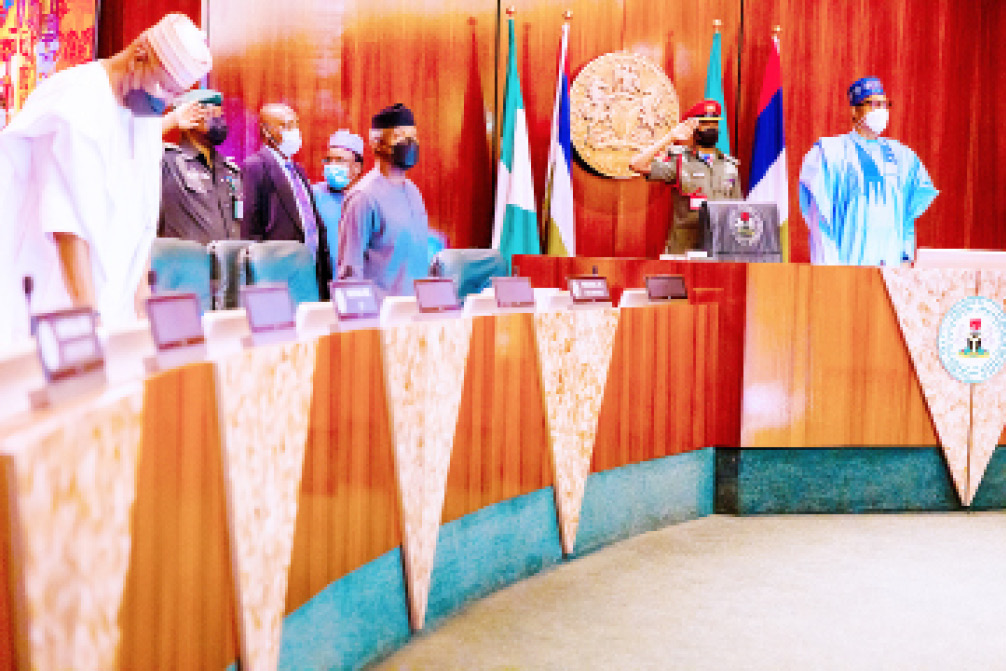On February 3, 2022, President Muhammadu Buhari inaugurated the Committee on the Repatriation, Return and Resettlement of Internally Displaced Persons (IDPs) in the North East of Nigeria.
The members include ministers of Finance, Budget and National Planning, Attorney General and Minister of Justice, Humanitarian Affairs, Disaster Management, Social Development, Interior, Foreign Affairs and Defence.
- Strengthening Nigeria-China relationship for mutual progress
- Leaders reach common ground to save Nigeria
Others are heads of leading military and para-military organisations, the North-East Development Commission, National Commission for Refugees, Migrants, Internally Displaced Persons and National Emergency Management Agency.
The terms of reference include shifting from managing the situation to activating a permanent solution for effective and practicable restoration, developing a concise three-year action plan by the end of March 2022 that incorporates national and state-level plans and providing a clear pathway for the restoration of peace and development in the North-East.
The team is also expected to develop and implement a phased plan for the repatriation, return, resettlement of IDPs and restoration of livelihoods, incorporating global best practices that give dignity to the affected populations and to develop and implement a coordinated peace-building and reconciliation programme that is culturally appropriate and community-driven. It is also to strengthen collaboration with key donors, development partners and private sector organisations that are critical to the mobilisation of resources and implementation of programmes.
The committee is in line with an announcement by the Federal Commissioner, National Commission for Refugees, Migrants and Internally Displaced Persons (NCFRMI), Imaan Sulaiman-Ibrahim, in October last year, of the federal government’s plan to close down all IDP camps in the country to enable the refugees to move back to their communities and become productive citizens again, as they reintegrate into the society.
This is a welcome development as indeed it is about time the displaced persons are rehabilitated and resettled. We support any effort aimed at making life easier for this group of persons who have faced untold hardships.
According to statistics from the National Emergency Management Agency (NEMA), in Borno State, functional IDP camps are 245, comprising of 190,591 households with a total of 831,321 individuals. Thirty-two of these are government-run camps while others are run by Non-Governmental Organisations (NGOs).
The displaced persons include 353, 697 boys (0-18 years), 442,129 girls (0-18 years), 23,116 pregnant women, and 62,813 lactating mothers, 1,581 persons living with disabilities, 1,201 separated minors, and 941 unaccompanied kids. The list also includes 6,063 orphans (children), 16,578 elderly men, and 1,891 elderly women.
The statistics further show that a total of 130,056 were returnee households in the state, consisting of 740,595 individuals. In addition to these, in a chat with newsmen while distributing Christmas foodstuffs to IDPs last December, the Executive Secretary of State Emergency Management Agency (SEMA), Emmanuel Shior, said there are 17,000 IDPs in various camps in Benue State.
We cannot overemphasise the importance of this task and the need for the committee to give it the seriousness it deserves to ensure that the victims of insurgency and other crises finally find succour.
In resettling the IDPs, however, their security must be paramount. Wherever they are taken to must be fully secured. The security of the IDPs must go beyond assurances as government must ensure that the right security infrastructure is on the ground so that returnee IDPs don’t suffer double jeopardy.
The committee must also reach out to all refugees from the region currently taking refuge outside the North East. For example, in the Federal Capital Territory (FCT) alone, there are four IDP camps – Lugbe, Area One, New Kuchingoro and Kuje – this should be noted.
Adequate housing should be provided for them. In fact, the federal and state government agencies must intensify efforts to build new cities for displaced persons. Again, it must be emphasized that the camps closure and the settlement of the IDPs must be done in phases to avoid lapses that may endanger their lives.
The federal government’s intervention agencies should also work with international NGOs for the IDPs to gain decent employment through interventions such as vocational training to keep them busy. They must be trained in their new trades while farmers should be helped with farming tools so that all eligible adults would be able to sustain themselves.
Most importantly, closing down and resettling IDPs should follow all international standards as spelt out in the Kampala Convention. This exercise must not be devoid of the usual tardiness associated implementation of programmes in the country.

 Join Daily Trust WhatsApp Community For Quick Access To News and Happenings Around You.
Join Daily Trust WhatsApp Community For Quick Access To News and Happenings Around You.


